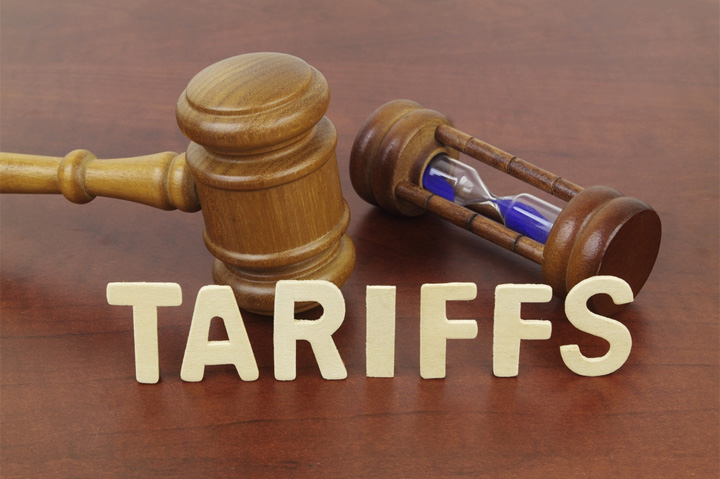News June 11, 2025
Federal Circuit Upholds Order Allowing Trump Tariffs To Remain for Now
The ruling wasn’t based on the merits or lack thereof of the levies, but rather preserves the status quo while an appeal in a case focused on the import duties plays out.
Key Takeaways
• Tariffs Remain Enforceable: The U.S. Court of Appeals for the Federal Circuit ruled that Trump’s 2025 tariffs under challenge will remain in effect while a case before it focused on the levies proceeds.
• Legal Background: The case before the Federal Circuit centers on the Trump administration appealing a trade court ruling that had voided many of the tariffs the president has implemented this year.
• Economic & Industry Impact: The ongoing tariffs have disrupted supply chains, increased costs and raised concerns about inventory shortages in the promotional products sector.
The U.S. Court of Appeals for the Federal Circuit ruled this week that tariffs President Donald Trump has implemented in 2025 can remain in effect while it considers a case centered on the import levies.
The appeals court agreed to expedite hearing the case and expects to consider arguments on July 31. Barring something unforeseen, the tariffs would remain enforceable until at least that time, according to legal analysts.
Whichever side loses the case – the federal government or businesses and states seeking to have the courts abolish the tariffs – will likely appeal to the Supreme Court.

On May 28, a three-judge panel from the U.S. Court of International Trade struck down many of the Trump tariffs, ruling that the president exceeded his legal authority in imposing the levies. The administration immediately appealed, and on May 29, the Federal Circuit granted the White House’s request to pause the Court of International Trade’s ruling, staying it “until further notice.”
Still, plaintiffs in two cases upon which the trade court’s ruling was based sought to have the stay lifted, submitting arguments in favor of that move. Those arguments asserted, in part, that allowing the levies to continue even temporarily would put some American companies affected by them out of business.
Ultimately, the appeals court decided to allow the tariffs to remain in place until the case is adjudicated. The crux of the case before the appeals court lies in the Trump administration asking that the trade court’s ruling nixing the tariffs be tossed out.
Fallout from tariffs President Donald Trump has imposed in 2025 have led promo products sourcing leaders to predict the industry will experience inventory shortages. This Promo Insiders podcast from ASI Media explores the issue.
It should be pointed out that the appeals court decision to allow the tariffs to stay in effect for now was not based on the levies having legal merit – or not, for that matter.
“It’s important to note that every court to rule on the merits so far has found these tariffs unlawful, and we have faith that this court will likewise see what is plain as day: that IEEPA does not allow the president to impose whatever tax he wants whenever he wants,” Jeffrey Schwab, an attorney for the Liberty Justice Center, a libertarian legal group representing five small businesses challenging the tariffs in the case, said in a statement.
The “IEEPA” Schwab references is the International Emergency Economic Powers Act of 1977, upon which Trump has sought to build the legal foundation for many of the tariffs he has pressed forward with in 2025. The federal government believes Trump is well within his authority to leverage IEEPA to impose tariffs.
“The Trump administration is legally using the powers granted to the executive branch by the Constitution and Congress to address our country’s national emergencies of persistent goods trade deficits and drug trafficking,” White House Spokesman Kush Desai said. “The U.S. Circuit Court of Appeals’ stay order is a welcome development, and we look forward to ultimately prevailing in court.”
The appeals court noted that the small businesses and states seeking to have the tariffs overturned and the Trump administration have both “made substantial arguments on the merits.”
The U.S. Court of International Trade’s ruling had barred enforcement of the 25% tariffs on Canadian and Mexican imports not covered by the United States-Mexico-Canada Agreement, the cumulative 30% additional tariff put on China-made imports this year (which had been as high as 145% prior to a suspension of that rate), the 10% baseline tariff rate on imports from all countries, and the currently paused reciprocal/nation-specific tariffs that Trump placed on particular countries based on duties and alleged trade barriers they have against the U.S.
Under the Federal Circuit’s ruling this week, the Trump administration can continue to enforce those tariffs, along with the elimination of the de minimis importing exemption for products made in China and Hong Kong, while the appeals case proceeds.
The trade court’s ruling did not impact various other tariffs, including Section 301 duties Trump imposed during his first presidential term and tariffs enacted under Section 232 of the Trade Expansion Act of 1962. As such, the 50% tariff on steel and aluminum products, which affects categories like drinkware in the promotional products industry, are among the tariffs that are continuing unabated.
The various tariffs and uncertainty related to them have hurt sales and driven up pricing in the promotional products industry while also affecting importing and sourcing strategies and raising worries about inventory shortages.
